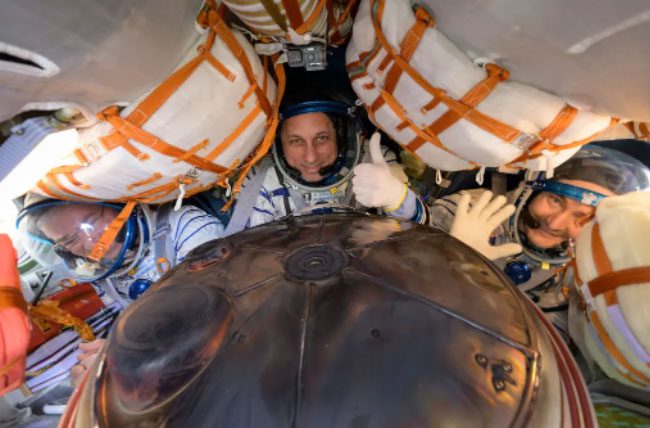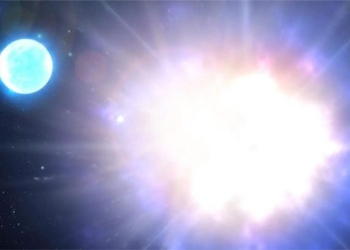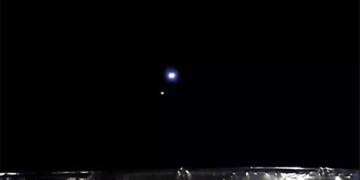For many weeks following the conflict in Ukraine, the International Space Station (ISS) has been seen as a symbol of cooperation for science and non-politics. However, statements like “science is not affected by politics” seem to be mere rhetoric.
The future of the ISS is now in question, as Russia has warned it may cease cooperation with the West on related space missions if sanctions imposed on the country are not lifted.
A Crumbling Symbol

American astronaut Mark Vande Hei (left) with Russian astronauts Anton Shkaplerov (center) and Pyotr Dubrov (right) after landing on Earth in Dzhezkazgan, Kazakhstan on March 30. NASA expressed gratitude to Russia following the successful landing – (Photo: NASA)
Russia and the West are turning collaborative space projects into targets for retaliation and sanctions. On March 17, Europe announced it would end cooperation with Russia on the ExoMars project exploring life on Mars due to the invasion of Ukraine.
On March 21, OneWeb, a British satellite company, also postponed the launch of 36 satellites on a Russian rocket and switched to SpaceX of the United States.
Last week, the return flight to Earth of a NASA astronaut and two Russian colleagues aboard a spacecraft developed by Russia raised hopes that cooperation between Russia and the West on the ISS would not collapse.
However, this notion was shaken when Dmitry Rogozin, the head of the Russian Federal Space Agency (Roscosmos), threatened to end the partnership if the West did not lift the sanctions against Russia.
In a Twitter post on April 2, Rogozin asserted that space projects related to the ISS and others could not be resumed or continued as usual.
He described the sanctions as a way for the West to attempt to “kill the Russian economy and drive the people into despair and hunger” and asserted that this intention would certainly fail.
Roscosmos will soon report to the Russian government on when to end cooperation on the ISS with the space agencies of the U.S., Canada, the EU, and Japan. Earlier, Rogozin warned that the sanctions could destroy the relationship between NASA and Roscosmos on the ISS.
Will the ISS Fall Without Russia?
Rogozin also warned that the ISS—the largest artificial satellite of humanity—could fall to Earth without Russia’s support.
He explained that Russia plays a significant role in manufacturing the speed and orbit adjustment systems of the ISS to avoid space debris. Adjustments occur about 11 times a year on average, and only Russian spacecraft can carry the upgrade equipment to this system.
The components of the ISS, built by NASA and Russia, are separate but closely interconnected.
The Russians rely on American solar panels for power, while Russian cargo ships provide periodic boost equipment to prevent the station from falling into the atmosphere.
Joel Montalbano, the ISS program director at NASA, described operating the ISS as an activity that “no country can separate and go its own way.”
The New York Times referred to the Ukraine conflict as a critical test for NASA regarding how far the agency can operate the ISS without Russia.
For nearly a decade after the shuttle program ended, Russia’s Soyuz spacecraft was the only means for Americans to reach and return from the ISS. Now, NASA has begun using SpaceX’s spacecraft and is preparing to launch the Starliner—crewed spacecraft developed by Boeing, expected to take off later this year.
However, NASA still wants some astronauts to fly on Russia’s Soyuz, according to the New York Times. Instead of paying as before, NASA seeks a mutual exchange, where Russian astronauts would fly on American spacecraft and vice versa.
Although the two sides have yet to reach an agreement on this, Russian astronauts have traveled to Houston (USA) and begun their training process.
“This is a very challenging time for international relations” – NASA astronaut Mark Vande Hei, who just returned to Earth on a Russian spacecraft, shared with the New York Times. He hopes that the bonds between the West and Russia through the space program will be maintained, contributing to the search for peace and reconciliation.
Russia Strengthens Cooperation with China
NASA aims to upgrade and extend the ISS’s lifespan until 2030, but Russia disagrees and wants the ISS’s historic mission to conclude in 2024.
According to the New York Times, given the current context, Russia may be looking to develop its own space station or enhance cooperation with China.
China-Russia space cooperation has developed in recent years, including agreements on the Chinese Chang’e 6 and 7 missions and Russia’s Luna 27, a joint data center for lunar and deep space exploration, along with a project called “International Lunar Research Station” (ILRS).
The first launches in the effort to build the ILRS are scheduled to begin in 2030, utilizing new generation heavy-lift rockets developed by both Russia and China.





















































